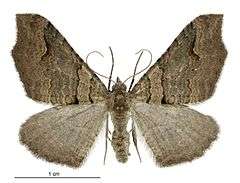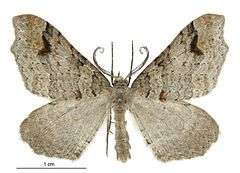Austrocidaria parora
Austrocidaria parora is a species of moth of the family Geometridae. It is endemic to New Zealand.
| Austrocidaria parora | |
|---|---|
 | |
| Female | |
 | |
| Male | |
| Scientific classification | |
| Kingdom: | |
| Phylum: | |
| Class: | |
| Order: | |
| Family: | |
| Tribe: | |
| Genus: | |
| Species: | A. parora |
| Binomial name | |
| Austrocidaria parora (Meyrick, 1884) | |
| Synonyms | |
| |
Taxonomy
This species was described by Edward Meyrick in 1884 as Harpalyce parora.[1][2] In 1886 Meyrick recognised that the genus name he had used for this species had been used previously and renamed the genus in which he placed this species as Probolaea.[3] In 1898 George Hudson placed this species within the Asaphodes genus.[4] In 1906 George Howes, discussing the species under the name Asaphodes parora, also illustrated it.[5] In 1928 Hudson discussed and illustrated the species again under the name Asaphodes parora.[6] In 1988 J. S. Dugdale placed this species within the genus Austrocidaria.[7]
The lectotype specimen is held at the Natural History Museum, London.[7]
Description
Hudson described this species in 1898 as follows:
Male, female. — 29-34 mm. (about 1 1⁄4 inches) . Fore-wings moderate, apex acute, termen excavated on upper half, acutely projecting in middle ; varying from light grey to light reddish-fuscous ; about eighteen irregular dentate darker striae, sometimes partially obsolete; first three, seventh and eighth, and eleventh to thirteenth usually more distinct and blackish ; seventh and eighth closely approximated, forming a small blackish or reddish spot on dorsum, sometimes partially suffused with blackish ; eleventh to thirteenth closely approximated, widely remote from eighth, parallel to termen ; a blackish discal dot ; sometimes a broad purplish-grey median band ; sixteenth sometimes spotted with blackish towards costa; a terminal row of blackish dots. Hind-wings moderate, upper angle broadly projecting, termen shortly projecting in middle ; varying from whitish-grey to very pale reddish- fuscous, faintly striated with darker.[4]
It is regarded as being variable in colour.[4]
Distribution
Austrocidaria parora is endemic to New Zealand.[8][9] The lectotype specimen was collected at Riccarton Bush in Christchurch. This species has also been collected at Mount Ruapehu,[6] Whanganui,[6] Lake Horowhenua,[6] Wellington,[4] Greymouth,[10] Mount Hutt,[4] Central Otago,[11][12] and Invercargill.[6]
Behaviour and biology
Adults have been recorded as being on wing in January and February as well as in August and September.[10][13] The larvae feed on Coprosma species.[12]
References
- Meyrick, Edward (1884). "Supplement to a monograph of the New Zealand Geometridae". New Zealand Journal of Science. 2: 234–235 – via Biodiversity Heritage Library.
- Meyrick, Edward (1885). "Supplement to a Monograph of the New Zealand Geometrina". Transactions and Proceedings of the New Zealand Institute. 17: 62–68 – via Biodiversity Heritage Library.
- Meyrick, Edward (May 1886). "Notes on Nomenclature of New Zealand Geometrina". Transactions and Proceedings of the New Zealand Institute. 18: 184 – via Biodiversity Heritage Library.
- Hudson, G. V. (1898). New Zealand moths and butterflies (Macro-lepidoptera). London: West, Newman & Co. p. 56. doi:10.5962/bhl.title.32466 – via Biodiversity Heritage Library.
- Howes, George (1906). "Note on the Occurrence of Two Rare and Two Introduced Moths". Transactions and Proceedings of the New Zealand Institute. 38: 509 – via Biodiversity Heritage Library.
- Hudson, G. V. (1928). The Butterflies and Moths of New Zealand. Wellington: Ferguson & Osborn Ltd. pp. 108–109.
- Dugdale, J. S. (1988). "Lepidoptera - annotated catalogue, and keys to family-group taxa" (PDF). Fauna of New Zealand. 14: 175. Retrieved 24 September 2019.
- Gordon, Dennis P., ed. (2010). New Zealand Inventory of Biodiversity. Volume two. Kingdom Animalia: Chaetognatha, Ecdysozoa, Ichnofossils. 2. Christchurch, N.Z.: Canterbury University Press. p. 459. ISBN 9781877257933. OCLC 973607714.
- "Austrocidaria parora (Meyrick, 1884)". www.nzor.org.nz. Landcare Research New Zealand Ltd. Retrieved 2017-08-22.
- Lyford, Brian M. (1994). "Lepidoptera and Trichoptera from Paroa, near Greymouth, New Zealand". New Zealand Entomologist. 17 (1): 46–51. CiteSeerX 10.1.1.728.7273. doi:10.1080/00779962.1994.9721984. ISSN 0077-9962.
- Wildland Consultants Ltd (2017). "Evaluation of a proposed significant natural area at Mt Iron, Wanaka" (PDF). Queenstown Lakes District Council. Retrieved 25 September 2019.
- Department of Conservation (July 2005). Crown Pastoral Land Tenure Review - Lake Hawea part 1 (PDF) (Report). Land Information New Zealand. Retrieved 22 August 2017.
- Philpott, Alfred (1930). "The Lepidoptera of Mount Cook District, with descriptions of new species" (PDF). Transactions and Proceedings of the New Zealand Institute. 61: 419–439 – via National Library of New Zealand.
External links
| Wikimedia Commons has media related to Austrocidaria parora. |
| Wikispecies has information related to Austrocidaria parora |